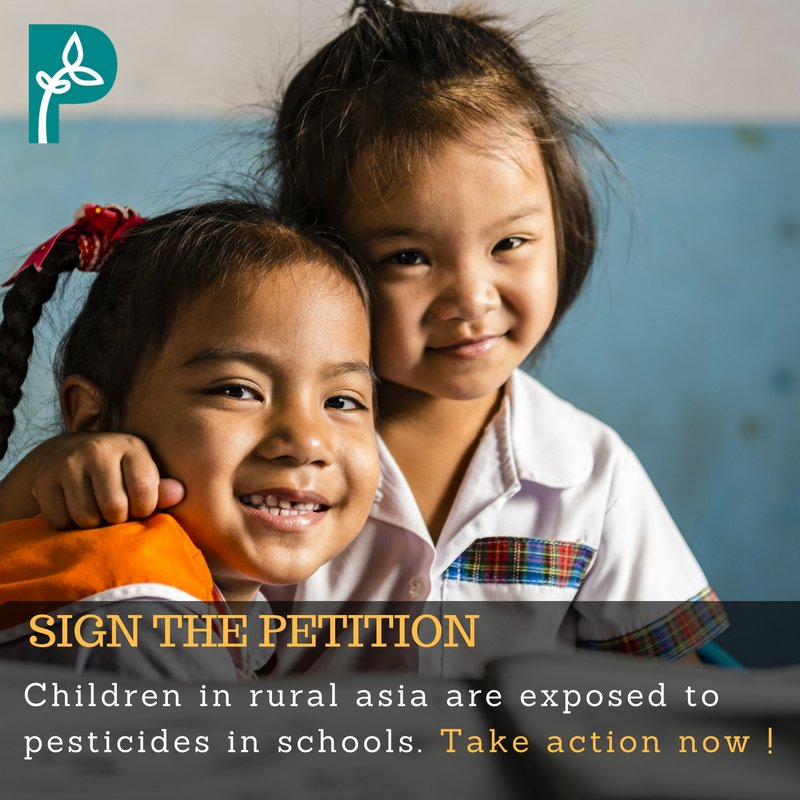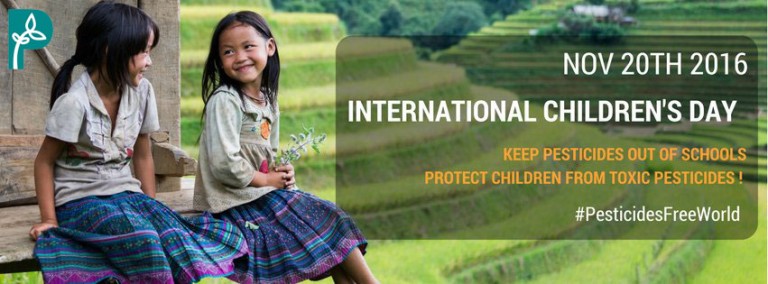PENANG, Malaysia – As children are globally celebrated today, the regional advocacy group PAN Asia Pacific (PANAP) along with partners have called for pesticide-free buffer zones to put our children out of pesticides harm’s way.
As the world observes the UN’s Universal Children’s Day today, regional advocacy group PAN Asia Pacific (PANAP) and its partners called on governments to implement pesticide-free buffer zones around schools to help protect children from pesticides’ harmful effects.
Children’s Day marks the adoption by the UN of the Declaration of the Rights of the Child on 20 November 1959 and the Convention on the Rights of the Child on 20 November 1989. For PANAP, however, the rights of children to health and development as articulated in the said conventions are being violated by the continued use of toxic agrochemicals.
“It is distressing to find out that many children are exposed to pesticides including in schools that are close to farms and other agricultural sites that spray these poisonous chemicals. This is a serious matter that should be urgently addressed by policy makers,” said PANAP Executive Director Sarojeni Rengam.
Rengam argued that so-called ‘pesticides drift’ – the airborne movement of pesticides away from the intended target – poses great risk to rural communities, especially children. Pesticides and other toxic chemicals have detrimental impact on a child’s neurodevelopment and intelligence leading to learning disorders, among other effects.
PANAP noted that pesticides drift was behind the recent poisoning of 30 school children in Po Ampil Primary School in Cambodia. Similar incidents have also occurred in the US (Mendocino and Ventura Counties, California), the Philippines (Davao del Norte), and Sri Lanka (Nuwara Eliya District).
For her part, Deeppa Ravindran, Coordinator of PANAP’s Protect Our Children from Toxic Pesticides campaign, added “Schools are supposed to be safe places for children to learn and grow. That they are constantly exposed to pesticides even in such places is just unacceptable.”
 Meanwhile, the UN is also beginning to pay attention on the issue. Last September 2016, the UN Special Rapporteur on Human Rights and Toxics Baskut Tuncak said that “States have a duty and businesses a corresponding responsibility, to prevent childhood exposure (from toxic chemicals)”. But Tuncak observed that the laws, policies and practices of States and businesses are inconsistent with such obligation.
Meanwhile, the UN is also beginning to pay attention on the issue. Last September 2016, the UN Special Rapporteur on Human Rights and Toxics Baskut Tuncak said that “States have a duty and businesses a corresponding responsibility, to prevent childhood exposure (from toxic chemicals)”. But Tuncak observed that the laws, policies and practices of States and businesses are inconsistent with such obligation.
PANAP emphasized that implementing pesticide-free buffer zones is one of the immediate measures that governments can do to protect and uphold the rights of children.
Reference: Deeppa Ravindran, PAN Asia Pacific, Pesticides Programme Coordinator, deeppa.ravindran@panap.net
Taking a stand to protect our children on the occasion of the International Children’s Day would be a meaningful gift to humanity. Kindly sign the petition at https://www.change.org/p/urge-the-state-governments-to-institute-pesticide-free-buffer-zones-around-schools.








Discussion about this post